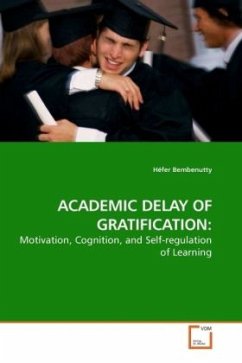This book reports new findings associating learners willingness to delay gratification with their academic achievement, motivation for learning, and use of cognitive and self-regulated learning strategies. This book calls the attention of learners, parents, and educators to the vital role that delay of gratification plays in every aspect of learning. In today s society, a learning experience cannot be successful without learners giving up immediately available and less valuable rewards for the sake of attaining long-term academic goals. Here, delay of gratification is conceptualized under the umbrella of self-regulation of learning, which represents students ability to control their feelings, cognition, and behavior in order to attain academic goals, select appropriate learning strategies, and monitor and evaluate their academic progress. This book reports new findings associating delay of gratification with positive academic outcomes such as self-regulation of learning, self- efficacy beliefs, intrinsic motivation, use of cognitive strategies, and time management.








